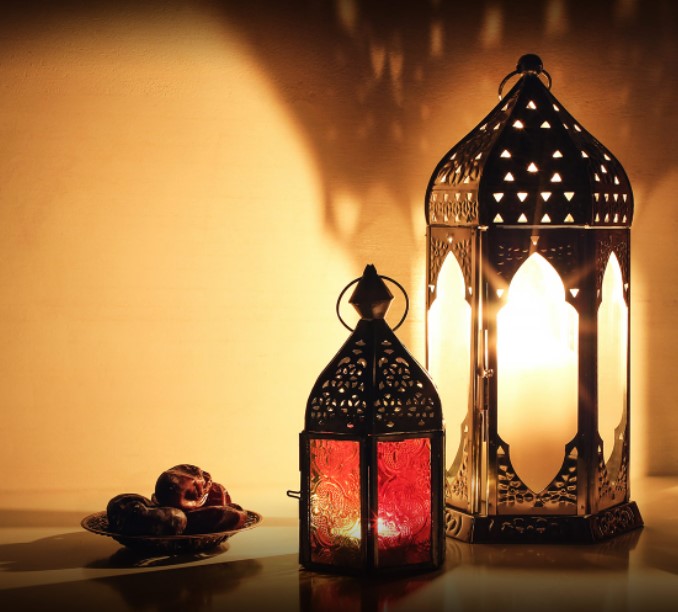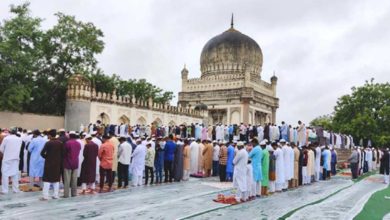My first Ramadan as a mother showed me that true worship is about quality not quantity
I’ve realised that Ramadan and early motherhood have a lot in common. Both involve sacrifice and long nights spent in contemplative solitude. Both demand you transcend your own desires to focus on something bigger than yourself. Both possess the power to teach and transform.
But five months into motherhood and in the final stretch of Ramadan, it became clear to me that most of all, both pass too quickly. Fleeting and impermanent, they leave you a little empty in their absence – wishing you savoured the brief moments they offered before they disappeared.
Last year slipped away from me in the throes of morning sickness and pregnancy-induced exhaustion and looking back now, I wish that I had taken advantage of my last Ramadan before motherhood. If only I had relished being able to attend taraweeh (evening prayer) without worrying about disturbing the congregation and appreciated being able to stay up until suhur (pre-dawn meal) everyday.
This is my second Ramadan without fasting – pregnant and breastfeeding women are exempt – and this year I welcomed the holy month with a mixture of conflicting emotions. Grateful to belong to a faith that recognises the physical toll of motherhood, offering allowances in its toughest stages and relieved that I didn’t need to fast whilst caring for a small baby and grappling with my seemingly insatiable postpartum appetite. But I was also worried that I’d be spiritually detached without fasting. I missed that visceral satisfaction of curbing your body’s needs to focus on the growth of your soul, that gratifying delight in finally eating after a long day of abstinence. I was concerned that I wouldn’t be able to put my all into worship as motherhood sapped the last of my energy and time.
Motherhood is relentless and demanding, joyful but exhausting, and this doesn’t stop for Ramadan. So many times this month I’ve felt like I’m miles behind those who are able to immerse themselves entirely in devotion. Whilst many Muslims finish the entire Qur’an in the month, I’ve barely managed a quarter of that. Whilst others go to the mosque every night for taraweeh, I’ve braved it just a couple of times and each time I’ve left early with a crying baby in tow.
But the challenge of navigating Ramadan as a new mother has proven a valuable lesson. As Muslims, we believe that actions are judged by intentions. Remembering this has helped me reframe motherhood through the lens of worship – to become more present in the mundanity of the everyday and less spiritually detached from this special month. Keeping my child warm and fed, happy and clean, becomes something intentional and significant. My contribution to the community: the shaping of a healthy and happy future generation. A way to thank God for blessing me with this tiny human with an infectious laugh and edible cheeks.
This Ramadan has also taught me to be kinder to myself and more realistic with my goals – to focus on quality of worship rather than quantity. I can’t stay up all night praying right now and that’s okay. At the moment, I can’t commit to reading the whole Qur’an in 30 days and that’s okay too, because I’m expressing worship in other ways.
Although Ramadan is about personal growth, it is also about community. From family iftars to communal worship at the mosque, I’ve found myself craving that sense of camaraderie this year. Perhaps it’s the legacy of two consecutive lockdown Ramadans or maybe it’s that motherhood really does require a village, but the few times that I’ve attempted taraweeh prayers at the mosque this year, I’ve been overcome by the sheer beauty of what it means to be part of a faith community.
Armed with a bag full of toys and an apology already on my tongue, each time I stepped into the mosque I did so tentatively, hovering near the door in case my son would choose that moment to erupt into a screaming fit. But every time, I was astounded by the reaction I received. From aunties swooping him up in their expert arms whilst I prayed, to total strangers repeatedly reassuring me that his squeals and screeches weren’t disturbing anyone. From teenagers offering to babysit, to women using their coats to make a makeshift bed for him on the floor. In our polarised times, there’s something moving about total strangers coming together to pray and become a brief part of one another’s lives before departing for another year. I’m grateful I got to experience that even a few times this Ramadan.
I was tempted to resign myself to failure this Ramadan, to wait for next year to participate “properly”. But if the last two years have taught us anything, it’s that tomorrow is never guaranteed. We have to make the most out of the moment.
As Ramadan comes to an end and we celebrate Eid, our minds turn to what we’ll wear and who we’ll see and where we’ll go. I’m excited for the feasting and family gatherings, but I’ll also grieve the magic of Ramadan that departs for another year.
At the start I was desperately hopeful that Ramadan could help me regain a part of the person that had been eroded by months of sleepless nights and cluster-feeding. I may not be leaving the holy month an entirely new person, but if I can manage to read a few pages of the Qur’an a day and try to focus on my prayers whilst blocking out the mental load of motherhood, be kind to my loved ones, good to my community and patient in the face of challenges, then in my mind I have honoured Ramadan’s transformational potential. And if I’m lucky enough to meet this special month again next year, then maybe in sha Allah (God willing) I can build on this.
Nadeine Asbali is a secondary school teacher in London








